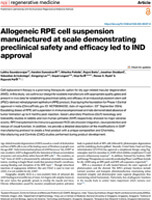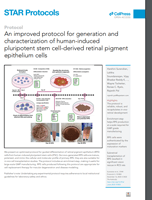Developing scalable cell replacement therapies for the world
Eyestem is a cell therapy company founded by a top-class management team consisting of clinical trial, cell therapy and ophthalmology experts. It also boasts a world class advisory board and has built collaborations with pioneers and leaders in the space. Our long-term vision is to create a scalable cell therapy platform to treat incurable diseases and democratize access to these newer technologies for the bottom 99 % of the population globally.
We have embedded manufacturing and quality processes in the platform which will enable us to create a virtuous cycle of innovation and decrease the time to market for such therapies. Our lead product out of the platform is Eyecyte-RPETM aimed at treating Dry AMD (Age-related Macular Degeneration). Dry AMD is the largest cause of incurable blindness in people above 60 and affects roughly 170 million people worldwide. Pivotal efficacy and safety studies for this product have started at Oregon Health and Science University and we expect to begin first in man studies for the same in 2024.








